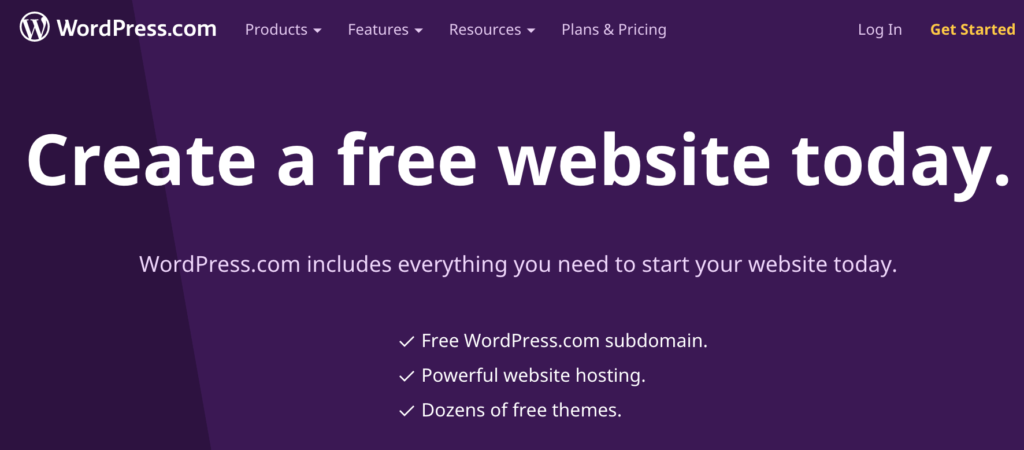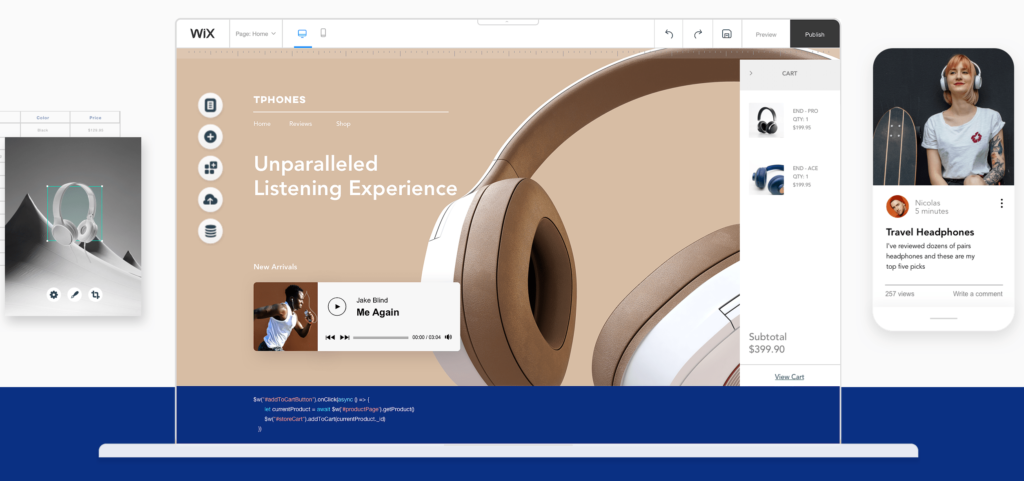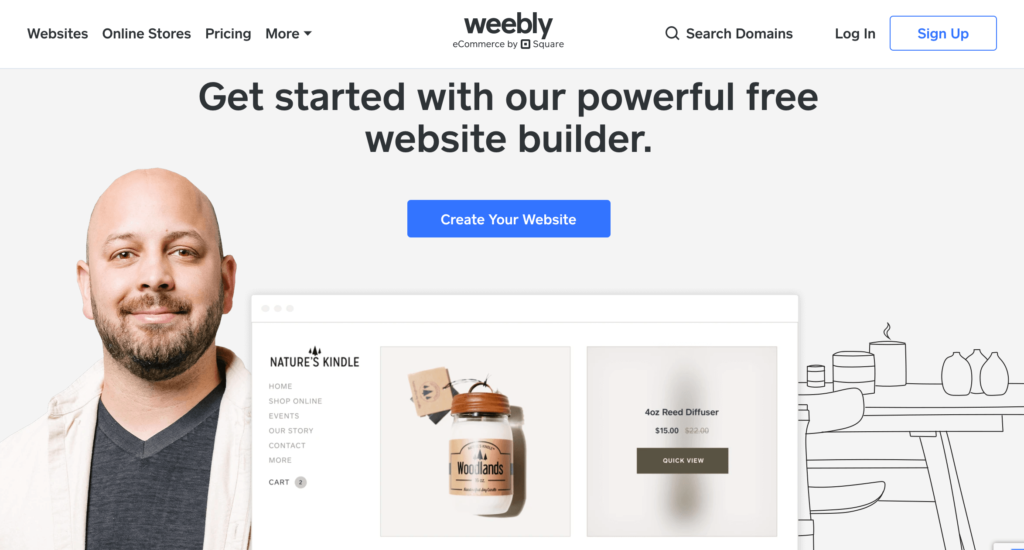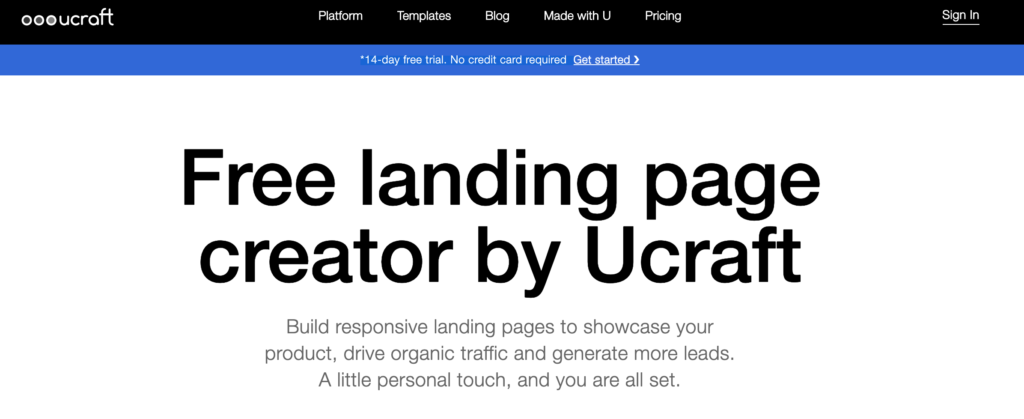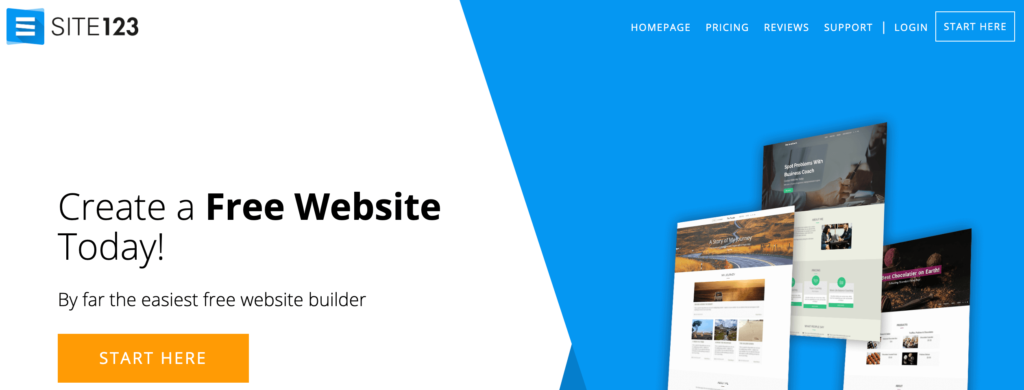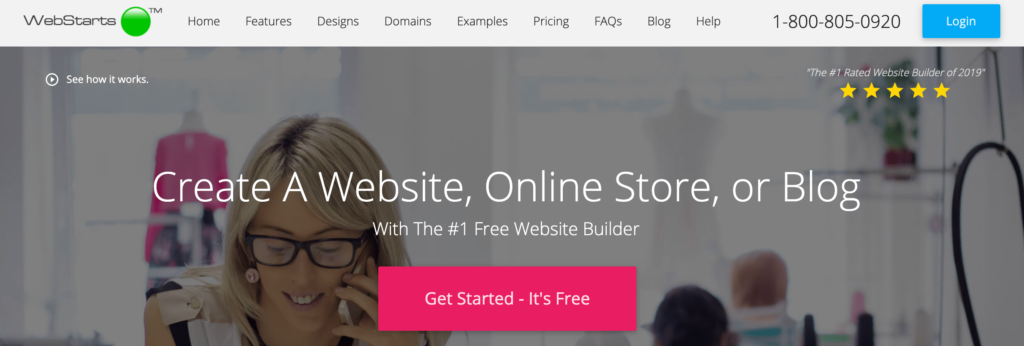Building a website has never been easier.
The days of developers and web designers being the only people who can create a website are long behind us. Anyone can create a website in minutes without writing a single line of code. All you need to do is find a website building platform.
But if you’re creating a website for the first time, you’re probably looking for the most cost-effective solution. You might want to test out different options to see what you like the best.
If this sounds like your situation, then I’m sure you’re looking for a free website builder.
Dozens and dozens of platforms out there will tell you that you can build a website for free. Unfortunately, building a legitimate website for free is actually not very realistic.
Most free website builders will be extremely limited or have some contingencies that require you to pay. It might start out as free, but you’ll quickly learn that it’s not truly free.
This shouldn’t discourage you from trying different website builders. Free website building plans are a great way to get your feet wet with web creation. A free plan will also help you pick a platform that you ultimately want to pay for down the road.
In this guide, I’ll show you the best free website builders on the market today. I’ll explain what you actually get for free, and what features require a premium membership.
The Top 12 Free Website Builders
All website builders offer free features. You’ll be able to get a free trial with nearly every website builder on the market today. But these 12 website builders have free plans that go beyond a trial period:
WordPress
34% of the entire Internet is powered by WordPress. It’s the most popular CMS in the world and a top choice for building a website.
With WordPress, you can create a website and get it live on the web without paying anything. Free plans include hosting, themes, and a WordPress.com subdomain.
Don’t expect high-level performance from the free hosting plan. The WordPress subdomain won’t be very professional either.
We use WordPress here at Quick Sprout, but we have a premium plan. If we stuck with the free option, our domain would look like this: https://ift.tt/32Y5dgj, which is obviously no good.
You do not need a credit card to create a free WordPress site. So you won’t have to worry about an expiring trial or being charged for hidden fees.
The free WordPress plan is best for getting started with something small, like a personal blog. It comes with Jetpack essential features, which has SEO tools and automation functionality. You’ll get a pre-installed SSL certificate, free templates, and 3 GB of storage.
It’s worth noting that WordPress is not a traditional website builder. You should have a basic understanding of writing HTML code and how it works to use WordPress.
When you’re ready to upgrade to a paid version of WordPress, these are your options:
- Personal — $4 per month
- Premium — $8 per month
- Business — $25 per month
- Ecommerce — $45 per month
WordPress users rely on plugins to add features and functionality to their sites. Many of these plugins require payment as well, which will add to your costs.
Wix
Wix lets you create a website for free without writing any code. It has a drag-and-drop editor that makes it easy for anyone to build something beautiful, regardless of their technical experience.
All you need to do is choose a template and customize it with your own content.
Here’s what you get with a free Wix plan:
- Hundreds of templates
- Stock images, icons, and clip art
- Free web hosting
- SEO assistance
- Mobile optimization
- Access to free apps in the Wix App Market
- 500 MB of storage and 1 GB of bandwidth
- Free Wix domain
The free Wix domain is even weirder than the WordPress one. It’s yourwixusername.wixsite.com/yoursiteaddress; which would look like this for us here at Quick Sprout — quicksproutadmin.wixsite.com/quicksprout.
Obviously, this type of domain is not reasonable or realistic to use if you’re serious about creating a legitimate website. But it’s fine for the beginning while you’re evaluating the Wix platform.
The free plan will also have Wix ads appear on every page of your website.
Using Wix for free will give you an introduction to their platform, but you’ll quickly learn that it’s very limited if you’re not paying. You’ll take an action or try to do something and be prompted to upgrade your plan, which can be a bit annoying.
Wix has premium plans starting at $13 per month for blogs, portfolios, and personal sites. Business and ecommerce rates start at $23 per month.
Weebly
Weebly is powered by Square, making it a website builder that’s geared toward ecommerce websites. So for those of you who are looking to create an online store from scratch, Weebly would be a top choice to consider.
Unfortunately, the free Weebly plan doesn’t come with any ecommerce functionality. You’ll need to upgrade for selling capabilities.
Here’s what you get with Weebly for free:
- SSL certificate
- 500 MB of storage
- Free hosting
- Domain name with Weebly branding
- SEO tools
- Lead capture and contact forms
- Access to community forums
- Live chat and email support
Compared to other free plans we’ve seen, this one is actually pretty good. It’s still extremely limited and I wouldn’t recommend it for the long-term, but it’s a viable option for starting out.
You can begin to collect customer information before your online store officially launches.
For $5 per month, you can connect your own domain to eliminate the Weebly branding. Aside from that, Weebly has premium plans starting at $12, $25, and $38 per month.
Webnode
Webnode is website building made easy. In minutes, you can create and publish your site on the web. It’s a great option for personal sites, businesses, and ecommerce shops.
More than 30 million people have built a website using this platform. Webnode has stunning templates that you can easily customize with your own content.
Unlike other free website builders, you can create an unlimited number of pages with the free plan from Webnode.
You’ll also get reliable hosting and access to customer service representatives.
The biggest catch is that your site will have a Webnode subdomain with your free plan. But this is pretty much the industry standard if you’re not willing to pay.
I’d only use the free plan for something simple like a blog. You can create your site, publish content, and then share your work on social media. But once you’re ready to take things to the next level, you’ll need to consider one of the following paid plans:
- Limited — $3.95 per month
- Mini — $5.95 per month
- Standard — $11.95 per month
- Prof — $19.95 per month
Webnode does require an annual subscription with all plans. So this won’t be the best choice for those of you who prefer month-to-month contracts.
Ucraft
Ucraft is a bit unique compared to some of the other platforms we’ve seen so far. It’s advertised as a landing page creator, as opposed to a website builder.
The free plan can be used to create simple single-page websites.
If you already have a domain name, you can connect it for free. This means your free site won’t be forced to use a ucraft.net subdomain, which is a big bonus since most free website builders won’t give you this luxury. However, your website will have Ucrafted branding on the page itself.
Here are some of the other features and benefits you’ll get for free with Ucraft:
- SSL certificate
- Drag and drop builder
- Visibility settings
- SEO tools
- Google analytics
- 24/7 support
- Password protected pages
- Free hosting
- Unlimited bandwidth
For a free plan, this is actually pretty good. Again, the only catch is that you’ll be limited to building just one page. To create more than that, you’ll need to upgrade to one of the following paid plans:
- Pro — $10 per month
- Pro Shop — $21 per month
- BigCommerce — $39 per month
All premium plans come with a 14-day free trial. No credit card required.
Onepager
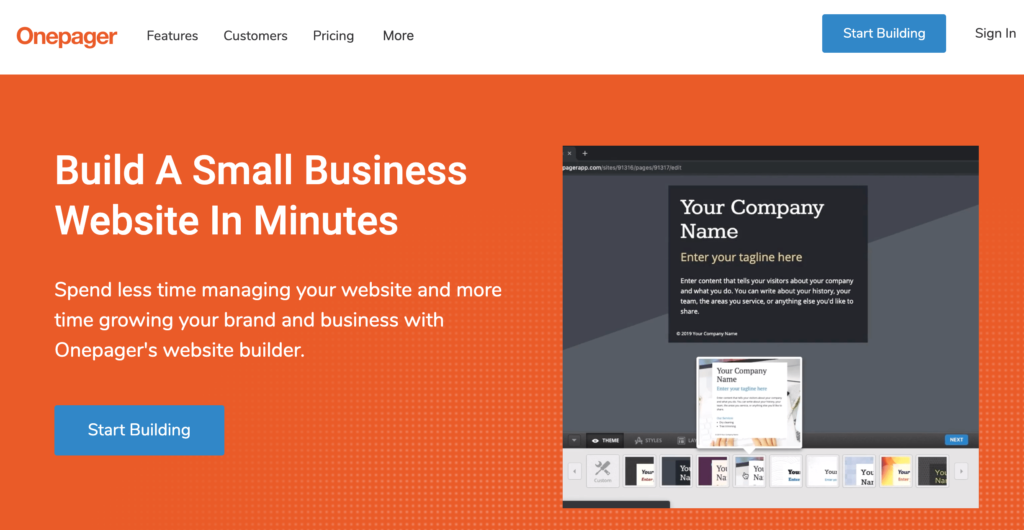
Onepager is a website builder marketed toward small business owners. It’s intended for people without much technical ability who want to create a site with ease.
Onepager offers a “free forever” plan, which is extremely limited. Here’s a quick overview of what you get (and don’t get) for free:
- Onepager branded domain
- No web analytics
- No email
- Onepager ads on your pages
- No ecommerce capability
- No custom forms
- No custom CSS
You’ll still get hosting and 24/7 support, but overall, I wouldn’t recommend the free site for any serious websites. Use this plan if you’re interested in trying Onepager as an extended trial.
To remove Onepager ads, use your custom domain, and activate ecommerce functionality, paid plans start at $8 per month with an annual contract.
Cindr
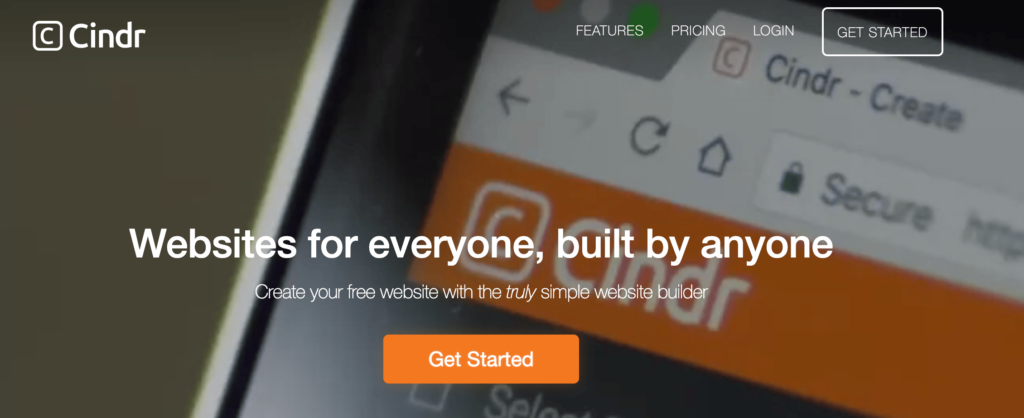
Building a website with Cindr is about as easy as it gets. They eliminated lots of the complex features and distractions for users who prefer simplicity.
You’ll be able to quickly add and publish photos, videos, music, text, and other content on your site in minutes. Designs are mobile-friendly and highly responsive.
You can create a site with Cindr without providing any credit card information. In fact, Cindr has just two plans; Free and Premium.
The free plan comes with:
- Custom design capability
- MyCindr.com domain
- Live chat and email support
- Unlimited pages
- Free hosting
- 1 GB of bandwidth
- Unlimited storage
Your free Cindr site will have Cindr ads displayed on your pages. To remove those ads, connect your own domain, and build multiple sites, you’ll need to upgrade your plan.
The Premium plan is $9 per month with no long term contracts. It also comes with unlimited bandwidth and storage.
Site123
Similar to our previous review, Site123 also has just two plans; Free and Premium. Compared to other website builders, the free plan is actually packed with quality features.
You’ll get everything included with the Premium plan, except you won’t be able to use your own custom domain. You’ll also be limited to just 500 MB of storage and 1 GB of bandwidth.
Aside from that, here are some of the features that come standard for free with Site123:
- Intuitive page editor
- Mobile-friendly designs
- Free hosting
- SEO tools
- 24/7 support
This website builder is a bit different from a traditional drag-and-drop editor. But it’s still easy to use and doesn’t require any code.
To get the most out of your Site123 website, upgrade to a Premium plan starting at $12.80 per month. This comes with ecommerce capabilities.
Strikingly
Millions of users have used Strikingly to create a website. It stands out from the other platforms on our list because it has ecommerce capability built-in, including the free version.
That’s right. For free, you can build an online store with Strikingly.
There’s just one catch. You can only have one product on display per website.
However, Strikingly lets you create an unlimited number of websites with the free plan. This is definitely better than some of the other options we’ve seen that restrict you to just one website or limited pages.
The free plan from Strikingly also offers 5 GB of bandwidth, which is more than we’ve seen from its competition.
As expected, you’ll be stuck with a Strikingly subdomain if you sign up for the free plan. To use your own domain and benefit from premium features, these are your upgrade options:
- Limited — $8 per month
- Pro — $16 per month
- VIP — $49 per month
These prices are based on annual contracts. To save money, Strikingly offers long-term contracts for up to five years. All premium plans come with a 14-day free trial.
Webstarts
Webstarts is another popular free website builder. It’s reliable, versatile, and extremely easy to use.
You can create a website with an unlimited number of pages, but Webstarts pretty limited beyond that.
The free plan doesn’t allow you to use a custom domain. There’s no social integration, emails, SEO tools, contact forms, or slideshows either.
Your free Webstarts site won’t be mobile-friendly and won’t give you HTML access or ecommerce capabilities. All free sites will have ads on every page.
Overall, you can’t really build a legitimate site unless you upgrade to a premium plan. There are two paid options, priced at $7.16 and $19.99 per month, respectively.
Yola
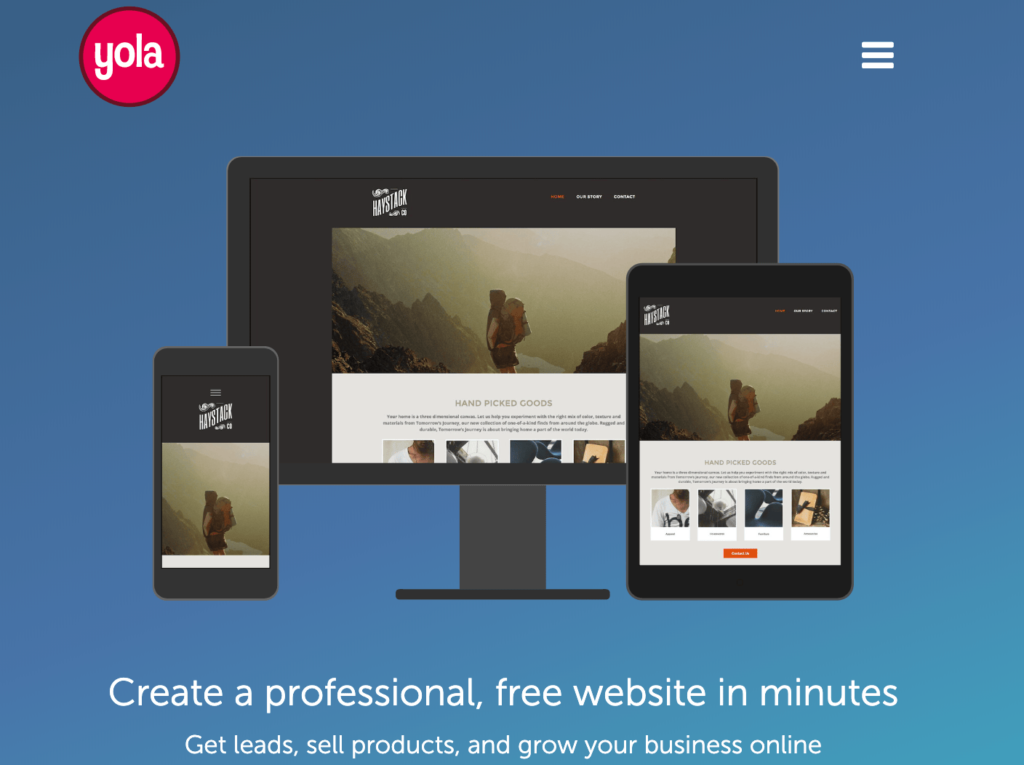
With Yola, you can create and publish a website online in less than 30 minutes. Unlike other free website builders, Yola won’t put ads on your pages, although you will have a Yola domain.
Yola’s drag-and-drop site builder is simple and easy to use. It doesn’t require any technical experience, making it a top choice for beginners.
With that said, advanced users can edit using HTML, JavaScript, and CSS.
The Yola free plan has 1 GB of bandwidth and 1 GB of storage. You’ll also benefit from features like:
- SEO tools
- Email support
- Web hosting with 99.9% uptime
- Social sharing
- Ability to embed YouTube videos
- Google Maps integration
- Video backgrounds
- Contact forms
- Tumblr blog integration
- Site statistics
However, there is one major contingency here. You can only build three web pages.
Obviously, that’s not reasonable for those of you who want to create a full website. The three pages are only enough to test out Yola’s platform to see if you like it enough to upgrade to:
- Bronze — $4.95 per month
- Silver — $9.95 per month
- Gold — $19.95 per month
All of these plans come with a 30-day money-back guarantee. You can add ecommerce capabilities to any premium plan for an extra $10 per month.
Jimdo
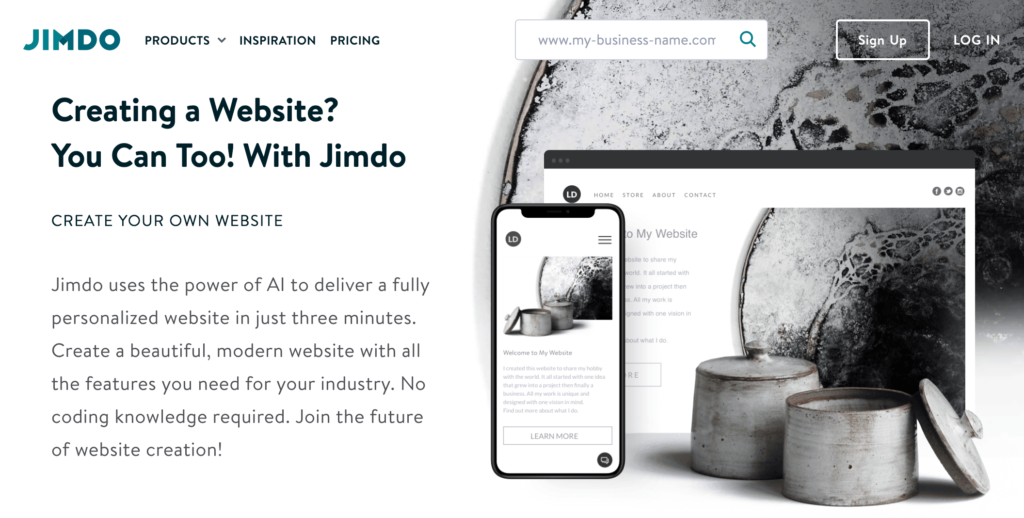
Jimdo was born back in 2007. Since then, more than 20 million websites have been built using this platform.
You can build a website for free using Jimdo, although your options will be extremely limited.
All free websites will have a .jimdosite.com subdomain. You’ll get 500 MB of storage, 2 GB of bandwidth, and HTTPS security. That’s pretty much it.
Jimdo will only let you build five web pages with the free plan. That’s obviously not enough to build a full website. But you’ll still be able to get your site live and see if you like the software before you upgrade.
I’d treat this free website builder as a trial that never expires. If you’re happy with the platform, then you can upgrade to one of the following paid plans:
- Start — $9 per month
- Grow — $15 per month
- Grow Business — $19 per month
- Grow Legal — $20 per month
- Unlimited — $39 per month
To get the most out of Jimdo, the Unlimited plan will be your best bet. It doesn’t have any restrictions and gives you better access to customer support. Jimdo also has ecommerce plans starting at $15 per month.
Hidden Costs of Free Website Builders
Lots of website builders say they are free, but they fail to mention any hidden costs. In reality, the majority of website builders are not truly free if you want to create and publish a legitimate website. These are some of the top hidden costs you need to keep an eye out for.
Custom Domain
Every free website builder on the market will give you a free branded domain with their name somewhere in the URL. But if you’re serious about publishing your site on the web, you’ll need to buy your own domain name.
There are a couple of site builders that let you connect your custom domain with a free plan, but you’ll still be paying for that elsewhere.
I do not recommend buying a domain from your website builder. Check out my list of the best domain registrars for more guidance with this process.
Web Hosting
Most free website builders will also offer free web hosting. But to be blunt—free web hosting stinks.
If you plan to have site visitors at any point after your site goes live, you’ll definitely need to take web hosting more seriously. Don’t worry, web hosting isn’t that expensive. These are my top recommendations for the best cheap web hosting plans.
Page Limitations
There are plenty of website builders out there that let you build a site for free with an unlimited number of pages. Some will even let you create an unlimited number of sites with a free plan.
However, there are other free website builders that restrict how many pages you can create before you’re forced to upgrade.
These page limitations can be as low as one or three pages. Obviously, you can’t build a full website with those types of restrictions. Adding pages will cost you money.
How to Choose the Best Website Builder For You
With so many free website builders on the market, choosing just one can be difficult. Here is the process that you should use when narrowing down the best option for your website.
Upgrades
If you want to start with a free website builder for now, that’s fine. But eventually, you’ll need to upgrade. You can’t really make a legitimate and high-quality website for free.
So choose a website builder that has plenty of upgrade options to meet your needs.
You don’t want to switch to a different platform when you’re ready to start paying. That’s too much of a hassle, and you’ll probably need to rebuild the majority of your site.
Ease of Use
You shouldn’t be struggling to create a website. Look for platforms with drag-and-drop builders and lots of templates that you can easily customize.
If you don’t have a technical background, this will make your life much easier.
Basic functions like adding text, images, videos, and creating new pages shouldn’t require too much effort. Managing your site, publishing blog posts, and everything else must be simple.
Some website builders, like WordPress, are extremely popular. However, WordPress doesn’t have a traditional drag-and-drop builder. So if you don’t have certain technical skills, avoid website builders that require coding knowledge.
Type of Website
What kind of website are you building?
Blogs, portfolios, ecommerce shops, and small business websites are all very different. You have to make sure that the website builder you choose has the ability to accommodate your needs.
Just because a website builder makes it easy for you to publish blog posts, it doesn’t mean it’s a great option for your online store. If you refer to the list above, you’ll see that some builders are definitely made for creating certain types of websites.
Conclusion
Creating a website for free is easy. All of the website builders on our list allow you to create a website for free.
But with that said, even the best free website builders are limited in some capacity. Some of these platforms will have more restrictions than others.
If you’re serious about creating a website, I would not recommend building it for free.
Instead, use these free builders to try different options. Think of these as extended free trials that won’t expire. Once you find a platform that you like, take a look at their paid options and upgrade to a suitable plan that meets your needs.
from Quick Sprout https://ift.tt/2XqgrZE
via IFTTT
